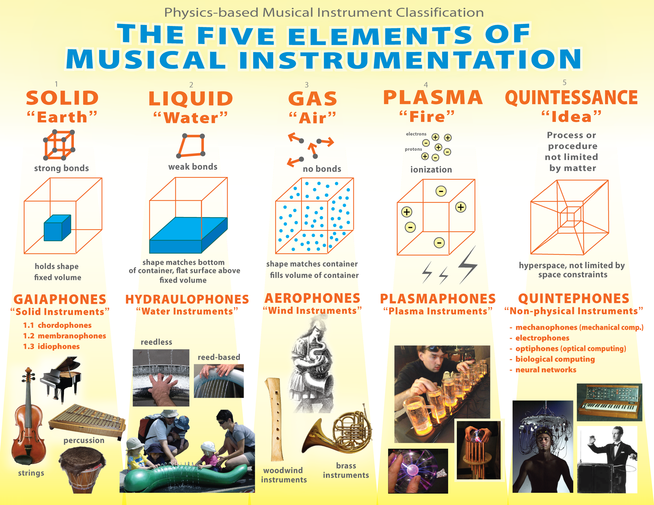- Organology
-
Organology (from Greek: ὄργανον - organon, "instrument" and λόγος - logos, "study") is the science of musical instruments and their classification.[1] It embraces study of instruments' history, instruments used in different cultures, technical aspects of how instruments produce sound, and musical instrument classification. There is a degree of overlap between organology, ethnomusicology (being subsets of musicology) and the branch of the acoustics devoted to musical instruments.
A number of ancient cultures left documents detailing the musical instruments used and their role in society; these documents sometimes included a classification system. The first major documents on the subjects from the west, however, date from the 16th century, with works such as Sebastian Virdung's Musica getuscht und ausgezogen (1511), and Martin Agricola's Musica instrumentalis deudsch (1529).
One of the most important organologists of the 17th century is Michael Praetorius. His Syntagma musicum (1618) is one of the most quoted works from that time on the subject, and is the source of much of what we know about renaissance musical instruments. Praetorius's Theatrum instrumentorium (1620) contains possibly the first pictures of African instruments in a European publication.
For much of the 18th and 19th centuries, little work was done on organology. Explorers returned to Europe with instruments from different cultures, however, so that by the end of the 19th century, some musical instrument collections were quite large. This led to a renewed interest in the subject.
One of the most important organologists of the 20th century was Curt Sachs, who, as well as writing Real-Lexicon der Musikinstrumente (1913) and The History of Musical Instruments (1942), devised with Erich von Hornbostel the Hornbostel-Sachs scheme of instrument classification, published in 1914. This remains the most common classification scheme used by organologists today, despite some criticism. Andre Schaeffner introduced a system based on state-of-matter of the sound-producing mechanism, giving rise to two top-level categories: solid (containing strings and percussion), and gas (containing woodwind and brass).[2] With the invention of hydraulophone, the physics-based organology has been expanded to use solid, liquid, and gas, wherein the top-level category is the state-of-matter of the material that makes the sound. Reference to Kartomi's book, page 173.
A number of societies exist dedicated to the study of musical instruments. Among the more prominent are the Galpin Society, based in the United Kingdom; and the American Musical Instrument Society, based in the United States.
Contents
Elementary organology
Elementary organology (also known as physical organology) is a classification scheme based on the Elements (i.e. state-of-matter), in which sound production takes place[3]
The Elementary Organology map can be traced to Kartomi, Schaeffner, Yamaguchi, and others,[4] as well as to the Greek and Roman concepts of Elementary classification of all objects, not just musical instruments.[4] Thus "elementary" refers to "element" (i.e. state-of-matter) as well as to something that is fundamental or innate (physical).[4][5]
Elementary organology (physical organology) categorizes musical instruments by their Classical Element, i.e.
Element State Category 1 Earth solids Gaiaphones the first category proposed by Andre Schaeffner;[6] 2 Water liquids hydraulophones 3 Air gases aerophones the second category proposed by Andre Schaeffner;[6] 4 Fire plasmas plasmaphones 5 Quintessence/Idea informatics quintephones Prominent Organologists
- Ivor Darreg, microtonal instrument builder
- Leo Fender, innovator of several electric guitar constructions (bridges and electronic configurations)
- Bart Hopkin, founder of Experimental Musical Instruments magazine
- Erich von Hornbostel, co-creator of the Hornbostel-Sachs musical instrument classification system
- Victor-Charles Mahillon, organologist and museum curator
- Bob Moog
- Harry Partch, microtonal string division musical theorist
- Curt Sachs, musicologist and organologist
- Andre Schaeffner
- Leon Theremin
- Anthony Baines, historical organologist and early authority on bagpipes
Ethno-organologists
- Mark Cherkasky - contemporary Ukrainian ethno-organologist, curator of the Museum of Ukrainian folk instruments in Kiev.
- Adolf Chybinski - Polish organologist
- Andriy Humeniuk - Ukrainian musicologist and ethno-organologist
- Mykhailo Khai - Ukrainian folklorist and ethno-organologist
- Hnat Khotkevych - Ukrainian engineer and musicologist.
- Filaret Kolessa - Ukrainian folklorist and ethno-organologist.
- Volodymyr Kushpet - contemporary Ukrainian ethno-organologist
- Klyment Kvitka - Russian and Ukrainian ethno-organologist
- Mykola Lysenko - Ukrainian composer and founder of Ukrainian organology
- Igor Matsiyevsky - Russian and Ukrainian ethno-organologist
- Kevin Dawe - British ethnomusicologist and organologist
See also
References
- ^ Organology
- ^ Kartomi
- ^ Computer Music Journal Fall 2008, Vol. 32, No. 3, Pages 25-41 Posted Online August 15, 2008. (doi:10.1162/comj.2008.32.3.25)
- ^ a b c Physiphones, NIME 2007, New York, pp118-123
- ^ Computer Music Journal Fall 2008, Vol. 32, No. 3, Pages 25-41
- ^ a b Kartomi, page 176, "On Concepts and Classifications of Musical Instruments", by Margaret J. Kartomi, University of Chicago Press, Chicago Studies in Ethnomusicology (CSE), 1990
External links
- The Galpin Society
- The American Musical Instrument Society
- Experimental Musical Instruments
- Department of Musical Instruments at The Metropolitan Museum of Art home to a large collection of historic musical instruments
Less commonly, organology can refer to the study of anatomical organs.
Categories:
Wikimedia Foundation. 2010.

